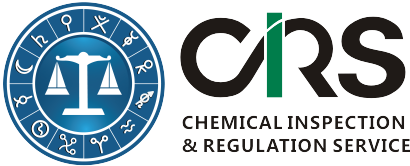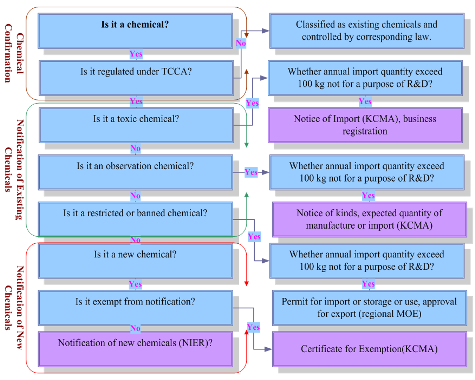Korea Toxic Chemicals Control Act (TCCA)
The Korean Toxic Chemicals Control Act (TCCA) was implemented in 1991 by the Ministry of Environment (MOE) for the overall management and control of industrial chemicals in Korea. The latest revised version (Act No.895) took effect on 21 Mar 2008. The purpose of this Act is to prevent any risk caused by chemicals to human health.
The National Institute of Environmental Research (NIER) is responsible for new chemical notification under the Act. Korea Chemicals Management Association (KCMA) of MOE is responsible for accepting declaration for details of other chemicals and application for confirmation certificate.
The current Toxic Chemical Control Act(TCCA) which came into force on 2 Feb 1991 will be divided into Korea REACH and Chemicals Control Act (CCA) on Jan 1, 2015. K-REACH focuses on registration and evaluation of substance while CCA focuses on the control of hazardous substance and response to chemical accidents.
More info about Korea REACH can be found here.
Exemptions under TCCA
The following products are out of scope of TCCA:
- (Radioactive substances as prescribed by the Atomic Energy Act
- Medicines, non-pharmaceutical drugs, and cosmetics as prescribed by the Pharmaceutical Affairs Act
- Narcotics and psychotropic drugs as prescribed by the Act on the Control of Narcotic Drugs and Other Analogous Substances
- Cosmetics as prescribed by the Cosmetics Act
- Technical ingredients and agrochemicals as prescribed by the Agrochemicals Control Act
- Fertilizers as prescribed by the Fertilizer Control Act
- Foods and food additives as prescribed by the Food Sanitation Act
- Livestock feeds as prescribed by the Control of Livestock and Fish Feed Act
- Explosives as prescribed by the Control of Firearms, Swords, Explosives, etc. Act
- Toxic gases as prescribed by the High-Pressure Gas Safety Control Act
Chemicals Regulated under TCCA
TCCA covers new chemicals, toxic chemicals, observational chemicals and restricted or banned chemicals. Other chemicals are not regulated by TCCA.Companies can go to the website of NIER, search the classified category of chemicals and take appropriate actions to comply.
For more information about how polymers are regulated in Korea and other countries, please click here.
The following picture illustrates how to determine category of chemicals and which actions shall be taken.
Korean Existing Chemicals Inventory (KECI) and New Chemical Notification
A new chemical means a chemical other than those defined as follows:
A chemical that was domestically commercialized prior to February 2, 1991 and was designated and published by the Minister of Environment in consultation with the Minister of Labor. The list of those is called the Korea Existing Chemicals Inventory (KECI).
Currently, there are around 42,000 chemicals in KECI. KECI can be accessed here:
http://ncis.nier.go.kr
Pursuant to the TCCA, manufacturers or importers of new chemical substances are required to make notification to relevant authorities prior to the commencement of their commercial activities if the volume of the new substance exceeds 0.1 ton per year.
New substance notified under TCCA will be regarded as notified under upcoming Korea REACH. Companies may notify a new substance now to save some costs before K-REACH enters into force.
Types of Notification and Data Requirement
- Simplified notification for chemical substance listed in 2 or more than 2 other nation's inventories before 1991;
- Semi-full notification for new chemical substances with volume below 1 ton per year;
- Full notification for other chemical substances;
You will find out specific data requirement for different types of notification by clicking here.
Exemption Rules for New Chemical Notification
Chemicals which fall into any of the categories below are totally exempted from the requirements of notification under TCCA:
- Substances in quantities of less than 100 kg a year per manufacturer or importer. Articles of a specific shape that contain chemicals for a specific function that are not likely to be released during use;
- Any chemicals imported with machine or equipment and serve as an essential and inseparable part of its functioning;
- Site limited, non-commercial R&D chemicals;
- Chemicals listed in Korean Existing Inventory (KECI). Chemicals not listed in the inventory, but were placed on the market before the implementation of TCCA in February of 1991;
- Block copolymer, if each block is listed in the KECI;
- Graft polymer, if the stem and all branches are listed in the KECI;
- Polymers that meet the 2% rules;
- Low concern polymer (application for exemption certificate is required);
- New chemicals for export only in quantities less than 10 MT cumulatively;
- New chemicals to be used as a non-isolated intermediate in specific processes
- New chemicals used for processes in which the possibilities of environmental emission or release at the workplace are negligible, such as in closed systems.
GHS in Korea
Before placing on the market, the substance or mixture should be classified and labeled if the hazard criterion is met. Classification and labeling recommendation based on GHS is mandatory in Korea.
Regulation for Classification & Labeling of Toxic Chemicals in Korea (Public Notice 2008-26) has set out grace period for GHS implementation in Korea. Substances need to classified and labeled according to GHS from 1 July 2011. Mixtures need to conform to the requirements of GHS from 1 July 2013.
In Feb 2012, The Ministry of Employment and Labor(MOEL) has issued revised Standard for Classification and Labeling of Chemical Substance and Material Safety Data Sheet by MoL Notice No 2012-14.
Compared to the old standard, the new standard mainly includes the following changes:
1. A new article regarding labeling information has been added(article 9);
2. Article 13: The recipient of a MSDS needs to issue a confirmation receipt;
3. Article 14: More information needs to be provided when SDS is updated or altered;
4. Article 20: This a new article regarding request for information not on MSDS;
5. Section 1 of SDS requires emergency contact info of supplier based in Korea;
6. Korean translations of some p and h statements have been updated(all updated statements are listed in purple red.) The English translations remain unchanged;
7. The classification criteria for environmental hazards have been updated to be consistent with EU CLP regulation(see last document).
More info about GHS in China, Korea and Japan can be found here.
Our Korea Chemical Compliance Services
- Training & consultancy;
- Search and confirm if a substance is new in Korea;
- Application of confirmation of exemption under TCCA;
- Dossier preparation and submission of new substance notification under TCCA(simplified, semi-full notification, full notification and polymer notification);
- Test monitoring/translation of study reports;
- Preparation of Korean SDS and label.
About Us and Contact
We have provided one-stop chemical notification and GHS services for many companies doing business in/with Asia (for example, China, Japan, Korea, Taiwan, Malaysia, and Philippine). We help them find out how their chemicals are regulated in those countries or regions and offer free initial consultations about how to comply. If notification is required, we help them submit chemical registrations. We also prepare or translate GHS compliant SDS and label in accordance with their national chemical legislation at affordable prices.
If you have any questions about chemical compliance in the Asia-pacific region, please contact:
- CIRS China
11F Building 1, Dongguan Hi-Tech Park, 288 Qiuyi Road, Binjiang District, Hangzhou 310052, China
Tel: +86-571 8720 6555 | Fax: +86-571 8720 6533
Email: service@cirs-reach.com





